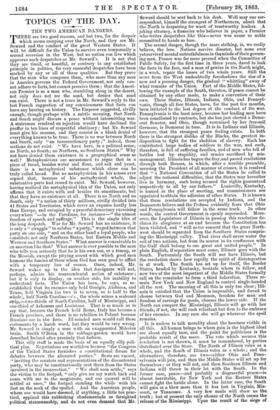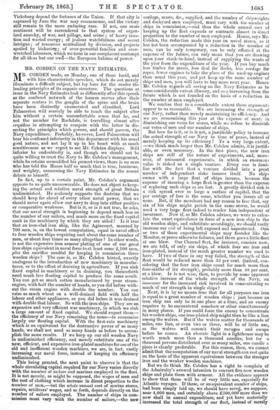TOPICS OF THE DAY.
THE TWO AMERIC AN DANGERS.
THERE are two good reasons, and but two, for the despair which seems creeping over the North, and they are Mr. Seward and the conduct of the great Western States. It will be difficult for the Union to survive even temporarily a second secession in the West, but no nation can live which approves such despatches as Mr. Seward's. It is not that they are timid, or boastful, or contrary to any established principle in politics, for very succesful despatches have been marked by any or all of these qualities. But they prove that the man who composes them, who more than any man in America governs the Federal Government, not only can- not adhere to facts, but cannot perceive them ; that the Ameri- can Premier is as a man who, stumbling along in the desert, not only does not see the sand, but denies that sand can exist. There is not a trace in Mr. Seward's reply to the last French suggestion of any consciousness that facts can have any bearing on history. The Emperor suggested, civilly enough, though perhaps with a subtle meaning, that North and South might discuss a peace without intermitting war. A statesman resolved on rejection would have declined the proffer in ten lines of respectful obstinacy ; but Mr. Seward must give his reasons, and they consist in a blank denial of everything known to be true. There is no war between North and South, only " an insurrectionary party ;" indeed, those sections do not exist. " We have here, in a political sense, no North, no South; no Northern, no Southern States." Why not have denied them existence in a geographical sense as well ? Metaphysicians are accustomed to argue that in a piece of bread, besides water and flour, and salt and yeast, there is a metaphysical substance which alone can be truly called bread. But no metaphysician in his senses ever argued that, because of his metaphysical whole, the substantive parts had ceased to exist. Mr. Seward. however, having realized the metaphysical idea of the Union, not only affirms that it exists with and besides its constituents, but that they have no existence at all. There is no North and no South, only "a nation of thirty millions, civilly divided into 41 States and Territories, which cover an expanse hardly less than Europe, and occupied by a peaceful democracy exercising everywhere "—in the Carolinas, for instance—" the utmost freedom of speech and suffrage." This is the single idea of the long despatch. War for Mr. Seward has no existence, it is only a " struggle" to subdue " a party," waged between that party on one side, "and on the other hand a loyal people, who constitute not only Northern States, but Eastern Middle and Western and Southern States." What answer is conceivable to an assertion like that? What answer is ever possible to the man who tells you seriously that he is his own son, or a teacup, or the Messiah, except the pityin., assent with which good men humour the fancies of those whom God has seen good to afflict with a temporary loss of reason. Once, indeed, Mr. Seward wakes up to the idea that foreigners will not, perhaps, admire his transcendental notion of substance ; but it is only to display, on another side, his inability to understand facts. The Union has been, he says, so re- established that its enemies only hold Georgia, Alabama, and Texas, half Virginia (as two is to seven, so is half to the whole), half North Carolina—i e., the whole minus a seaboard strip,—two-thirds of South Carolina, half of Mississippi, and one-third of Arkansas and Louisiana. That is as much as to say that, because the French hold Rome, Italy has become a French province, and there is no rebellion in Poland because Russians are in the forts. Ill-minded men would call these statements by a harsh word, but they would be very wrong. Mr. Seward is simply a man with an exaggerated Milesian brain. Smith O'Brien in the cabbage-garden would have described Ireland after precisely that fashion.
This silly stuff is made the basis of an equally silly poli- tical plan. Negotiations are worthless because "the Congress of the United States furnishes a constitutional forum for debates between the alienated parties." Seats are vacant, "inviting the senators and representatives of the discontented party, who may be constitutionally sent there from the States involved in the insurrection." " We shall soon settle," says the victim to the footpad, " only give me my watch back and come with me to the magistrate, and our quarrel will be settled at once," the footpad standing the while with his foot on the neck of the spoiled. And the American people, whom one would have deemed, if anything, a little too prac- tical, applaud this rubbishing rhodomontade as farsighted political statesmanship, and do not even demand that Mr. Seward should be sent back to his desk. Well may our cor- respondent, himself the strongest of Northerners, admit that the North is despairing for want of trustworthy leaders. A joking attorney, a financier who believes in paper, a Premier who writes despatches like this—never was cause so noble committed to hands so base.
The second danger, though the more striking, is, we really believe, the less. Nations survive disaster, but none ever yet survived mental untruthfulness in the minds of their govern- ing men. France was far more pressed when the Committee of Public Safety, for the first time in three years, dared to look the facts in the face, and a man of genius in the North might, in a week, repair the losses of two whole years. Still the news from the West undoubtedly foreshadows the rise of a new and a pressing danger, the gradual " whittling" away of what remains of the Union. Part of the Middle States, fol- lowing the example of the South, threaten, if peace cannot be obtained by any other mode, to make a convention of their own. These States, Illinois, Indiana, Ohio, and Pennsyl- vania, though all free States, have, for the past few months, been irritated to the last degree at the conduct of the war. Pennsylvania is the least noisy, because her leading men have been conciliated by contracts, but she has just elected a Demo- crat Senator, and Ohio, though restrained by her free-soil Germans, is Democrat in tone. It is in Indiana and Illinois, however, that the strongest peace feeling exists. In both there is the strongest dislike of the Blacks, the greatest in- disposition to fight for the abolition of slavery. Each has contributed large bodies of soldiers to the war, and each, therefore, is full of suffering families, and of men who tell of battles lost by stupidity, and armies sacrificed by mis- management. Illinois has begun the fray,and passed resolutions through both Houses, in which, after a terrible preamble, accusing the President of all manner of crimes, it is resolved that " a National Convention of all the States be called to adjust the nationnl difficulties, that the States may hereafter live in harmony, each being secured the rights guaranteed respectively to all by our fathers." Louisville, Kentucky, is named as the place of meeting, and commissioners are appointed to obtain the adhesion of other States. It is known that these resolutions are accepted by Indiana, and the Democrats believe and the Tribune evidently fears that Ohio and Pennsylvania will follow in the same track. In other words, the central Government is openly superseded. More- over, the Legislature of Illinois in passing this resolution de- clares its allegiance at an end because the Constitution has been violated, and " will never consent that the great North- west should be separated from the Southern States compris- ing the Mississippi valley. That river shall never water the soil of two nations, but from its source to its confluence with the Gulf shall belong to one great and united people." In plain English, if separation must come, Illinois goes with the South. Fortunately the South will not have Illinois, but the resolution shows how rapidly the spirit of disintegration is at work. The South has set up for itself, the Border States, headed by Kentucky, hesitate whom to follow, and now two of the most important of the Middle States formally call on the remainder to form a third federation. There re- main New York and New England to control single-handed all the rest. The meaning of all this is only too clear ; Illi- nois is satisfied that the Union is impossible, and forced to choose between God and Mammon, freedom for man and freedom of carriage for goods, chooses the lower side. If the North can conquer the Mississippi, Illinois will go with her friends; if not, she will rush reluctant but firm to the embrace of her enemies. In any case she will go wherever the spoil remains.
It is useless to talk morality about the baseness visible in all this. All human beings to whom gain is the highest ideal are about equally base, and the point for politicians is the probable result of the move. The vote which secures this resolution is not thrown, it must be remembered, by parties distributed over the State. The North of Illinois votes as a whole, and the South of Illinois votes as a whole ; and the alternatives, therefore, are two—either Ohio and Penn- sylvania will join, and then the Middle States will set up for themselves ; or they will not, and then Southern Illinois and Indiana will throw in their lot with the South. In the former case, peace—and probably a disgraceful peace—is almost inevitable, for New York and the Eastern States cannot fight the battle alone. In the latter case, the South will gain at a blow more than it has lost in Virginia, Mis- souri, or Tennessee. A very few mails will show us the truth; but at present the only chance of the North seems the release of the Mississippi. Upon the result of the siege of Vicksburg depend the fortunes of the -Union. If that city is captured by June the war may recommence, and the victory still remain to the more enduring race. If not, one more continent will be surrendered to that system of organ- ized anarchy, of war, and pillage, and crime ; of heavy taxa- tion and wasted energy ; of jealous watchfulness and secret intrigue ; of resources neutralized by division, and projects spoiled by bickering; of over-powerful families and over- wretched labourers, which we term in our complacent contempt for all ideas but our own—the European balance of power.































 Previous page
Previous page